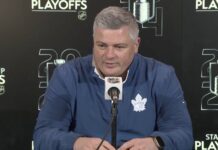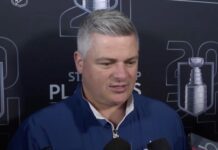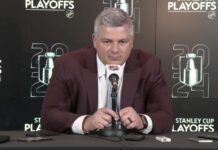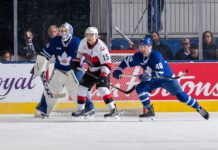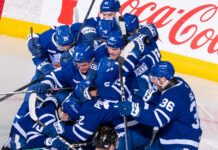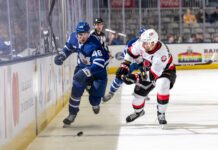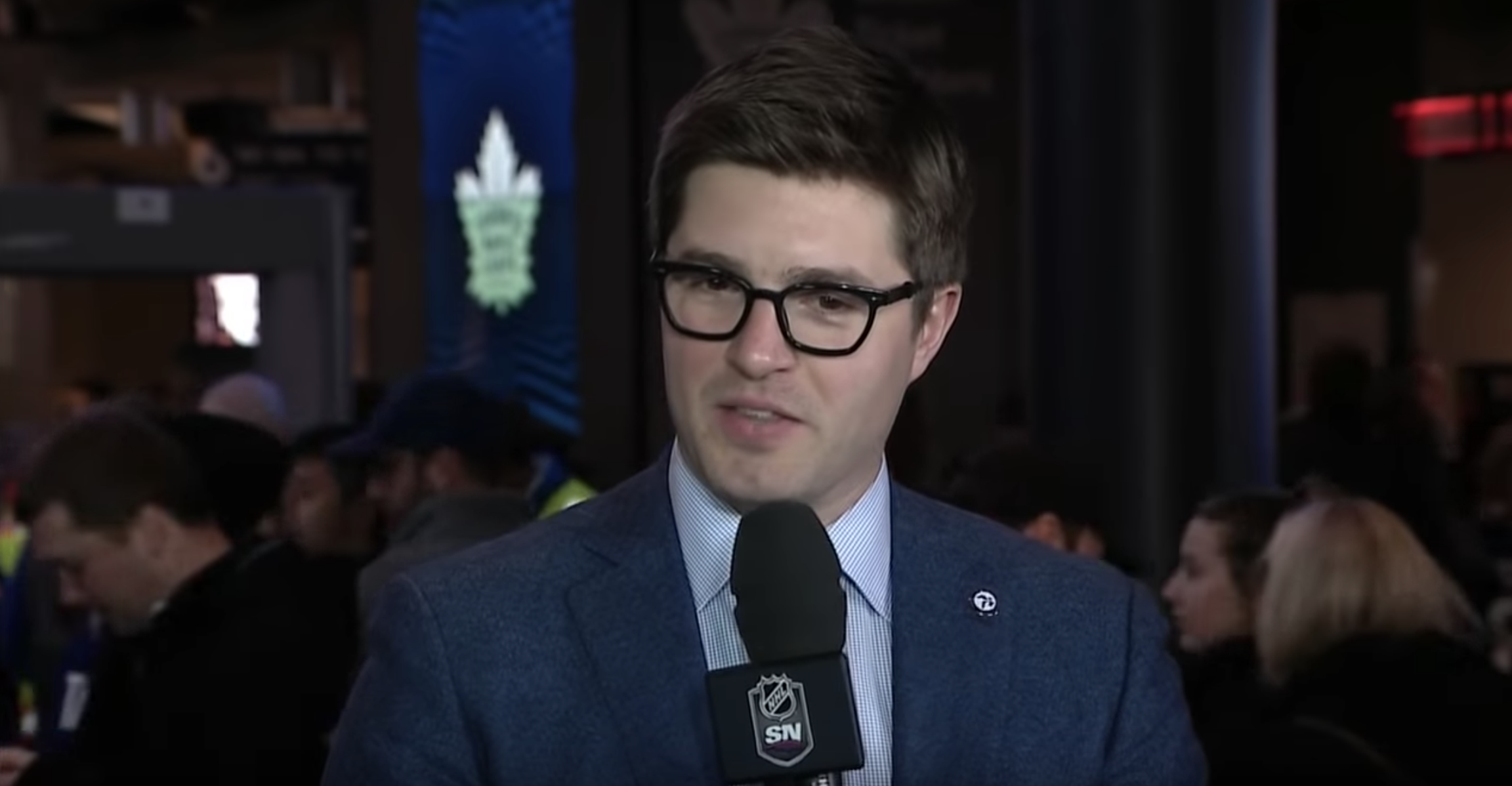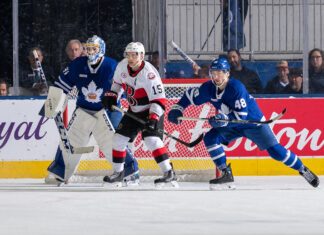On Hockey Central at Noon on Sportsnet 590 on Tuesday, GM Kyle Dubas evaluated his team at the pause and discussed the suspension of the season as well as possible options for the playoff format if play were to resume.
What was your evening like after the news of Rudy Gobert hit back on March 12?
Dubas: It was crazy, I guess, would be the best way to put it. You’ve got all of the players and staff reaching out and wondering what is going to happen. Gobert tested positive and as you are getting inundated with questions about how that is going to impact us, the NBA suspends the season and that only increases the curiosity and the questions about what is going to happen.
We had, of course, been following the entire situation from a medical perspective for a long time. Whether you are optimistic or a little bit naive, while you’re doing everything you can to prevent it, you think it is probably going to miss the impact on the sports world or athletics or whatever business you happen to be in. It then hits you right in the face that night that things are changing in an unprecedented way. It was absolutely the right decision as we’ve seen in the subsequent weeks and the way that the virus has continued to spread in the United States.
It was unprecedented and I was asked about it on a previous media call for the first time about reflecting on that night. It was a crazy night, to say the least.
Doesn’t it seem like it was more than two weeks ago?
Dubas: As it has gone by… I don’t know whether it’s gone by slowly or very, very quickly, but it does feel like years ago. We haven’t played a game now for three weeks. We played Tampa three weeks ago tonight and we were supposed to be in Washington tonight. Every time you are supposed to have a game, you think, “We’re supposed to be in Washington tonight,” or, “We’re supposed to be in Ottawa Saturday.” It kind of hits you that you are coming close to April suddenly — tomorrow. It is surreal.
Bill Daly said something that was very unusual for a league official. He said, “We actually might have more time than we think to play these games.” That can only mean they found some more building availability. Can you shed any light on that?
Dubas: Yeah, I think it goes back to the commissioner’s comments of wanting to maintain the integrity of the playoffs and the awarding of the Stanley Cup. As this has become a situation no one has dealt with before — it is not a work stoppage; it’s a hiatus for every league and for the entire world as we know it — in looking at the different options that are there, you perhaps don’t feel you have to have the Stanley Cup decided by mid-June. You can look beyond that and it might be the best thing for the league and for the players and for everybody.
I think the league has done a great job. The only thing that has been communicated to us is that it is their full intention to — if medically able to do so and the health and safety of everybody is not in question — be able to resume the season as best we possibly can and maintain the integrity of the season and the playoffs and roll from there.
As the situation has become more and more unprecedented, we look and say we may have to look at it a bit differently in terms of when the season happens and when it gets concluded and how that affects the next season. Right now, the primary focus is on the health of our communities and our country and everybody within.
If we went straight to the playoffs and the first or second round were a best of five with the final two rounds a best of seven, is that enough integrity?
Dubas: It’s such a unique situation. I haven’t really thought about it too much — I have kind of taken what the league has said in terms of the integrity of the playoffs — and I haven’t put too much thought into the reduction of different series or anything like that or different creative ways to get the league back up and running… The league has always said the integrity is paramount but doing so when it is safe to do so is going to be the key. Hopefully, we’ll all do our part here and be able to roll it out whenever possible.
There is going to be a new normal for all of us. There is going to be a new normal for the media and broadcasting. From a hockey point of view, when this is done, what do you think the effect is going to be on hockey? What is the future of handshakes after series in the playoffs — something as trivial at that? Have you looked down the road far enough to think about what the future of sports might be like and the carryover effects?
Dubas: I don’t and I haven’t. I am not sure what the impact of what has gone on with the health of the world will have on everybody when we come out of this. I think there will certainly be — and should be — a major push from everybody across the globe to become more in tune with the objective advice and objective warnings of the people that are at the top of the field when it comes to health and health care and investigating epidemics and pandemics and how we can avoid them — the use of proper hygiene, use of proper reporting, and transparency in regards to health issues and how the issue, regardless of where a virus or epidemic or pandemic begins, impacts the entire globe.
I know that the situation is awful and people are needlessly dying and there are unbelievable healthcare workers on the frontline putting themselves at risk every day to protect our communities and population. Anything that we take from this is that we have to do all that we can to do our part in our communities and our daily lives to protect those people who are willing to save great swaths of the population when things go poorly. I think there will be just an increase in general recognition that we all have to do more and we all have to heed the warnings of experts when different things come up in our world as we move ahead.
How would you evaluate your team at the pause? How would the GM of the Maple Leafs evaluate the Maple Leafs at the pause?
Dubas: Evaluating myself, I would always prefer to say that the job I do is reflected in the way that the team performs. If the team is inconsistent, then that’s the grade that should be placed on me if we haven’t reached our potential or played to our ability. That is a reflection on me in leading the hockey department here.
We have had some really bad moments during the year and we’ve had some bad stretches and some really bad games. The one thing I’ve grown to really like about our group is that when things go really bad and we have been embarrassed or embarrassed ourselves, the group has usually responded the next game, and usually against very difficult opponents. It has shown the ability, when the ball starts rolling down the hill, to dig in and stop it and start pushing it back up the other way.
The next step for us — you are never going to go through a whole season without a bad stretch or a bad number of games, but the next stage in our evolution is to reduce those number of games. I don’t think we are even close to where we aspire to be, but I think since Sheldon has come on, our goals against are down… We know we can score, and that’s great. It’s continuing to find ways to score as it gets tougher to do so, which we have had a little bit of trouble with before the pause.
Aside from a few bad blowups defensively, I think we were making good strides there. That is very important for us — we need to get our goals against into the 2.5 range. We were at 3.5 at the coaching change. From that point on, we’ve gotten down to about 3. We’ve got another half a goal a game to go. I think that will be a product of our defensive mindset.
Our group, like every team in the league, should be able to come back healthy from the break. We’ll have Andreas Johnsson out, but everyone else should be good to go and we’re excited to see that if and when we have the chance.
The team has shown that when it pays attention to detail, it can play a really nice defensive game, like the second Pittsburgh game. And then they go back to the beer-league style and get hammered, and you wonder what is going on here. But they can do it and are bright enough to make the commitment on the right side of the puck and do all of the little things.
Dubas: 100%. We have had a lot of those stretches or bad games, and you look at the next game on the schedule and go, “Oh, geez, it’s Pittsburgh, it’s Tampa, it’s Florida — strong teams.” We go into those games worried because of how poorly, especially defensively, things have gone. The team shows, when our mindset is in the right spot and we are dialled in and ready to roll, we can really defend at a high level against those teams. I think that’s team defending and the mindset of the team and being locked in to do so.
Now that we have shown we can do it, it will be a key message of ours coming back: We know that is is within the group. Now it will be about beginning to really value that each and every day and all throughout the season — especially in the playoffs, where teams are that good and the stakes are that high. Having that mindset in those moments is going to be paramount for us to get to where we want to go and that is contending every season.
We have a long way to go and we know that — and we know it is frustrating for a lot of people — but what we have gone through this season, notwithstanding the greater issues with society and health care, will prove to be a very valuable experience and lesson for our whole organization when we do resume.


